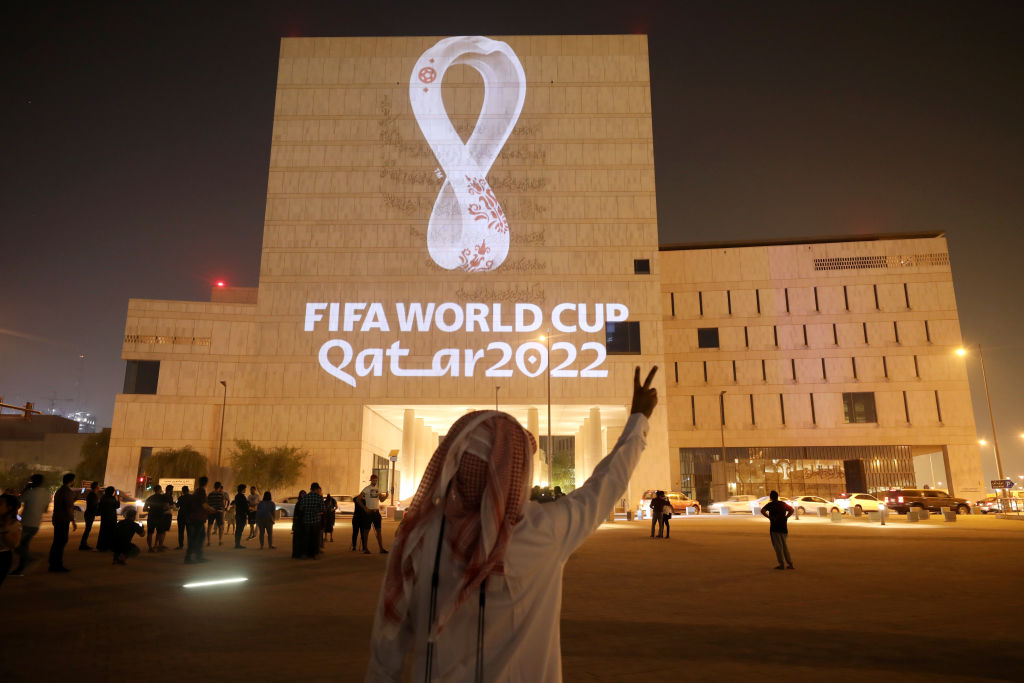The French have adopted a ‘when in Rome’ approach to the World Cup in Qatar, refraining from virtue-signalling their disapproval of their host’s beliefs. As their captain, Hugo Lloris, put it last week: ‘When we are in France, when we welcome foreigners, we often want them to follow our rules, to respect our culture, and I will do the same when I go to Qatar, quite simply. I can agree or disagree with their ideas, but I have to show respect.’
Of all western countries, France expects those who settle from different cultures to adhere to Republican values, particularly that of laïcité (secularism). This is in contrast to the multiculturalism of the Anglosphere where the prevalent philosophy is one of cheerful tolerance.
Qatar’s links with the Muslim Brotherhood have been well-documented in France in recent years.
When a poll revealed in 2016, for instance, that 52 per cent of British Muslims wanted homosexuality to be banned there was a muted response among the commentariat now kicking up such a fuss about Qatar’s homophobia. The Guardian, for example, pointed out the fact that the same survey revealed that 86 per cent of Muslims felt a ‘strong sense of belonging to Britain’
The Anglophone world are convinced that their approach is healthier, and frequent are their diatribes against what they perceive as the intolerance of the French, particularly towards their Muslim population. To the Americans and the British, the banning of the Niqab in public spaces, like the prohibition of the burkini on beaches, is the mark of a bigoted society.
When France banned the Niqab – the full-face veil – in 2010 a columnist in the Guardian wrote that it was ‘not difficult to see the racism which permeates this debate. It is about assertion of identity – under the soubriquet of protecting “our way of life”.’ The law was indeed an assertion of Republican values, although there was nothing racist about it. Just as there is nothing racist about Qatar’s reasonable decision to ban alcohol from the World Cup stadiums. Alcohol is not part of Islamic culture, just as the niqab is antithetical to French culture.
The matter should end there but for the fact that for many years Qatar has been using its financial clout to undermine French values.
Last week Le Figaro reported on the growing influence of the Muslim Brotherhood among Europe’s young Muslims, particularly in France, Holland and Belgium. The paper quoted a government report published in Belgium in 2021 on the activities of the Muslim Brotherhood, whose objective was ‘the progressive Islamisation of European society in all its components.’ Their long-term strategy is centred on ‘social-political militancy (activism), lobbying and entryism’, a soft-power approach that will take decades to achieve.
One recent example, cited by the historian and Sorbonne professor Pierre Vermeren, is the campaign to promote the hijab within Europe. Funded by the EU, the campaign has run a series of adverts, which included the taglines ‘Bring Joy & accept Hijabs’ and ‘Beauty is in Diversity as Freedom is in Hijab’. The campaign was pulled after a French-led backlash.
According to Vermeren, the campaign’s objective is part of the strategy to prevent Europe’s young Muslims integrating into western society. It is an efficient and well-organised campaign and one allegedly funded by Qatar.
Qatar’s links with the Muslim Brotherhood (they gave shelter to the recently deceased Egyptian cleric Youssef al-Qaradawi, the spiritual leader of the Brotherhood, who had voiced his support for suicide bombings against Israeli targets) have been well-documented in France in recent years.
In 2019 Gilles Kepel, the country’s most prominent scholar on Islamic extremism, published a book entitled Emerging from chaos, the crises in the Mediterranean and the Middle East. In it he explained that the ‘strategy of the Muslim Brotherhood is to proselytise in Europe, with Qatari financing’.
The same year one of Kepel’s peers, Alexandre Del Valle, a former security adviser, published The Project, a 550-page expose on the Muslim Brotherhood’s ‘strategy of conquest’. In a chapter devoted to Qatar, De Valle described the role of the state’s television channel, Al-Jazeera, the media wing of their soft power strategy, describing it as ‘anti-western’.
There has also been a 90-minute documentary, Qatar, a war of influence on Europe’s Islam, which highlighted the extent of the Gulf State’s role in bankrolling Islamic projects in Europe to the tune of €120 million.
The left-wing newspaper Liberation praised the documentary, saying it ‘raises the question of the financing of Muslim worship in France and western Europe. President Emmanuel Macron promised to tackle this issue. We still don’t see the solutions forthcoming’.
Three years on and France is more dependent than ever on Qatari energy to see it through the current crisis. Meanwhile the separatism between France and its Muslim youth grows; 74 per cent of French Muslims under the age of 25 put Islam before their country, a figure that drops to 25 per cent among those over 35. Overall, 63 per cent of French Muslims regard homosexuality as a ‘sickness’, a viewpoint propagated in books written by al-Qaradawi and available for purchase in France.
France should be commended for respecting Islamic culture but their host at the football world cup should stop using its money to undermine French values.







Comments